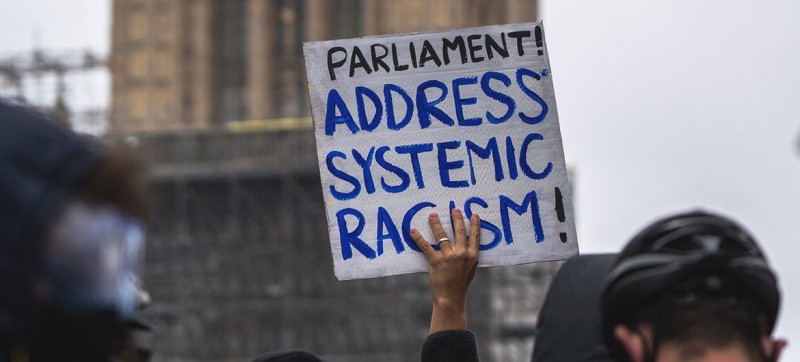
© Unsplash/James Eades Protestors take part in a Black Lives Matter demonstration in central London, UK. (file)
“We have serious concerns about impunity and the failure to address racial disparities in the criminal justice system, deaths in police custody, ‘joint enterprise’ convictions, and the dehumanising nature”, of the so-called ‘stop and search’ policing strategy, the UN Working Group of Experts on People of African Descent said in a statement at the end of an official visit to the UK.
‘Will this ever end?’
The Human Rights Council-appointed experts said they had gathered evidence of the all-too-real trauma felt by people of African descent who were suffering racial discrimination and injustice: “A woman of African descent we met during our visit lamented, ‘will this ever end?’” they said.
Tweet URL
A decade of economic austerity measures in the UK following the global crash of 2007-8, had exacerbated racism, racial discrimination and other intolerance which people of African descent encounter, thereby eroding their rights, the experts observed.
“From the perspective of people of African descent, racism in the UK is structural, institutional and systemic,” the experts said.
The lived experience dealing with State and public institutions, the private sector and society, was that it perpetuates racial hierarchies, the experts concluded.
Racist acts, persistent and widespread
“Racialised acts targeting people of African descent have remained steadfast, and the experience is similar across different parts of the UK,” the experts said. “They are victimised and have no assurance of effective redress from authorities or the justice system”.
Welcoming emerging efforts towards reparation for the legacies of the trade and trafficking in enslaved Africans, the Working Group encouraged all stakeholders including the Government, to do more to ensure rehabilitation, restoration, and reconciliation.
“Streamlining accessible, independent and effective complaint mechanisms to address racism, ensuring police accountability, fair trial guarantees for all persons, and redress to all persons affected by the Windrush scandal, are imperative”, said Catherine Namakula, Chair of the Working Group.
“Austerity to the peril of fundamental rights, is a costly undertaking for the UK,” she said.
Legacy of Windrush
The Windrush scandal erupted more than five years ago involving those born in the Caribbean who were brought to the UK as children, being asked by the UK Home Office – despite living in the country for 50 years – to prove their status as citizens, some having never been formally naturalized, or having never applied for a passport.
Dozens were deported or told they would be removed from the UK, despite being legal British subjects in their country of origin, and hundreds suffered hardships, threats and other deprivations of their rights, leading to the resignation of the then Home Secretary, in 2018.
The Working Group visited London, Birmingham, Manchester and Bristol in the course of their official visit.
The experts will present a report with their findings and recommendations to the UN Human Rights Council, later this year, in September.
Independent experts
The Working Group was established in 2002, following the World Conference against Racism, held in Durban, South Africa the previous year.
It is composed of five independent experts: Catherine Namakula (Uganda) current Chair-Rapporteur; Barbara Reynolds (Guyana) current Vice-Chair; Dominique Day (United States of America); and Miriam Ekiudoko (Hungary).
The Independent Experts are not UN staff and are independent from any government or organization. They serve in their individual capacity and do not receive a salary for their work.

